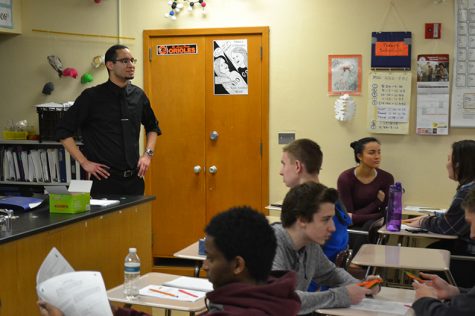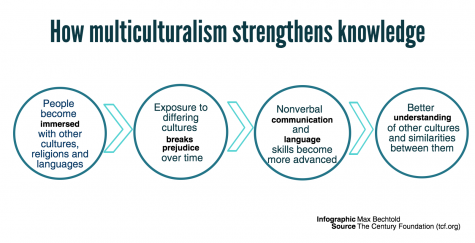Multiculturalism grows in Park
Students admire cultural, religious diversity
February 23, 2017

Chemistry teacher Alexander Polk oversees a class discussion between ethnically diverse students Feb. 15.
When chemistry teacher Alexander Polk observes the different communities at Park, he sees the effect of multiculturalism’s growth throughout his life.
Polk said he encourages the teaching of multiculturalism because of the growing diversity at Park.
“If you were to look at this community compared to other communities in the past, the integration would not have been the same case as it was back (when I was a kid),” Polk said. “The fact that I’m looking around and seeing a bunch of different groups represented in just one classroom or just one lunch table is something that I’m pretty happy about.”
Sophomore Anil Pillay said he believes in Islam because his family follows it, and Pillay said cultures define humans.
“Culture is the most important thing anyone can have. It’s an integral part of someone’s soul,” Pillay said. “It’s important to learn about cultural diversity because cultures can be misinterpreted by people who are not used to them.”
Senior Issiah Amla said he believes in Christianity because he was baptized as a Catholic, and Amla said he thinks students should learn about other religions because people shouldn’t be ridiculed due to religious beliefs.
“People should be knowledgeable about religion so they don’t make judgments or say things that they think are just a joke without knowing, but taken seriously by people who follow that religion,” Amla said.
Polk said he thinks different cultures shouldn’t be misunderstood, and that they help bring people together.
“Something big to me is that people get scared of things they don’t understand,” Polk said. “If you’re able to give a face to a group or a story to a person and show that there are a lot more things alike with you than things that separate you, that’s very significant.”
According to Polk, people should embrace cultural differences and remember all humans are very similar.
“Scientifically, we’re not that different. We’re all together, we’re in the same world, and hopefully we’re on the same team,” Polk said.



